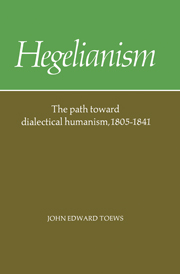Book contents
- Frontmatter
- Contents
- Preface
- Introduction: the Hegelian project in ideological perspective
- PART I PHILOSOPHY AND CULTURAL INTEGRATION: HEGEL IN CONTEXT
- PART II THE HISTORICAL APPROPRIATION OF THE ABSOLUTE: UNITY AND DIVERSITY IN THE HEGELIAN SCHOOL, 1805–1831
- PART III THE REDUCTION OF THE ABSOLUTE TO “MAN”: THE DIVISION OF THE SCHOOL AND THE EMERGENCE OF THE HEGELIAN LEFT, 1830–1841
- 7 Right, Center, and Left: the division of the Hegelian school in the 1830s
- 8 Strauss and the principle of immanence
- 9 Bruno Bauer and the reduction of absolute spirit to human self-consciousness
- 10 Feuerbach and the reduction of absolute spirit to human “species being”
- EPILOGUE: BEYOND “MAN” – THE RISE AND FALL OF LEFT HEGELIAN HUMANISM
- Notes
- Bibliography
- Index
9 - Bruno Bauer and the reduction of absolute spirit to human self-consciousness
Published online by Cambridge University Press: 08 January 2010
- Frontmatter
- Contents
- Preface
- Introduction: the Hegelian project in ideological perspective
- PART I PHILOSOPHY AND CULTURAL INTEGRATION: HEGEL IN CONTEXT
- PART II THE HISTORICAL APPROPRIATION OF THE ABSOLUTE: UNITY AND DIVERSITY IN THE HEGELIAN SCHOOL, 1805–1831
- PART III THE REDUCTION OF THE ABSOLUTE TO “MAN”: THE DIVISION OF THE SCHOOL AND THE EMERGENCE OF THE HEGELIAN LEFT, 1830–1841
- 7 Right, Center, and Left: the division of the Hegelian school in the 1830s
- 8 Strauss and the principle of immanence
- 9 Bruno Bauer and the reduction of absolute spirit to human self-consciousness
- 10 Feuerbach and the reduction of absolute spirit to human “species being”
- EPILOGUE: BEYOND “MAN” – THE RISE AND FALL OF LEFT HEGELIAN HUMANISM
- Notes
- Bibliography
- Index
Summary
Among the younger members of the Hegelian school during the 1830s it was Bruno Bauer whose scholarly interests and intellectual concerns most closely paralleled those of Strauss. Bauer, like Strauss, was a philosophical theologian and biblical scholar whose writings focused on the problem of defining the relationship between the historical truth, the representational form, and the universal, philosophically comprehensible, absolute content of the biblical revelation. Moreover, Bauer's successive attempts to construct a satisfactory resolution for this problem corresponded to the general stages in Strauss's development. Bauer began his intellectual career with the firm conviction that the Hegelian doctrine of the identity of content in the different forms of the religious Vorstellung and the philosophical Begriff provided a secure basis for the reconciliation of the orthodox Christian faith with modern philosophical consciousness. Between 1835 and 1838 he tried to revise and reconstruct the Hegelian identity of religion and philosophy in a manner that would take the historical criticism of the biblical writings into account. Like Strauss, however, Bauer abandoned this attempt to reconstruct the Hegelian identity in 1839-41 and asserted the absolute opposition of modern philosophical consciousness to both the form and the content of traditional Christian culture. Finally, Bauer, like Strauss, defined the model of cultural integration for the future, post-Christian era in totally immanent terms, not as the reconciliation of God and man in an actualized Kingdom of God on earth, but as the reconciliation of man with his universal human essence in a “state of humanity.”
- Type
- Chapter
- Information
- HegelianismThe Path Toward Dialectical Humanism, 1805–1841, pp. 288 - 326Publisher: Cambridge University PressPrint publication year: 1981

